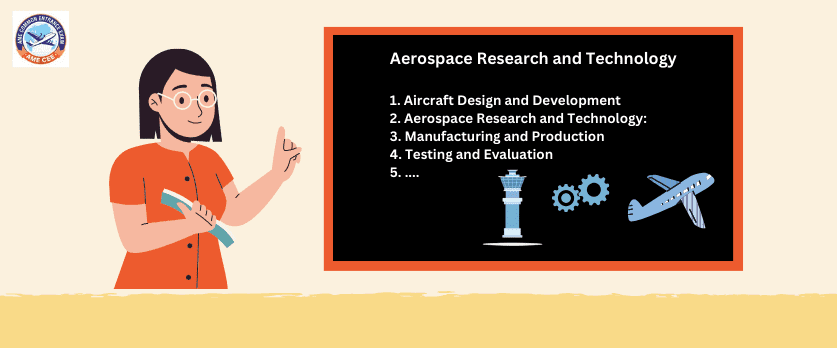Aeronautical engineering is a field that holds immense scope, offering exciting opportunities and challenges for professionals who dream of shaping the future of aviation. The scope of aeronautical engineering encompasses a wide range of activities related to the design, development, testing, and maintenance of aircraft and spacecraft. Let’s explore the key aspects that define the extensive scope of aeronautical engineering:
Aircraft Design and Development
Aeronautical engineers are at the forefront of designing and developing innovative aircraft, ensuring they meet stringent safety, performance, and efficiency standards.
Aerospace Research and Technology
The field involves continuous research to enhance aircraft technology, propulsion systems, materials, and aerodynamics, pushing the boundaries of what’s possible in aviation.
Manufacturing and Production
Aeronautical engineers play a vital role in the manufacturing process, overseeing the production of aircraft components, ensuring quality control, and optimizing manufacturing processes.
Testing and Evaluation
The scope extends to testing aircraft in various conditions to assess performance, reliability, and safety. Engineers are involved in simulation testing, wind tunnel experiments, and real-world trials.
Maintenance and Repair
Aeronautical engineers are crucial in developing maintenance and repair procedures, ensuring the ongoing safety and operational efficiency of aircraft throughout their lifespan.
Avionics and Systems Integration
Avionics engineers focus on the integration of electronic systems in aircraft, including navigation, communication, and control systems, enhancing overall aircraft functionality.
Propulsion Systems
A key aspect of aeronautical engineering involves the design and improvement of propulsion systems, exploring advancements in engines, fuel efficiency, and alternative propulsion technologies.
Specializations
Aeronautical engineers can specialize in various areas such as aerodynamics, structures, materials, avionics, or propulsion, allowing them to focus on specific aspects of aircraft design and development.
Space Exploration
With the convergence of aeronautics and astronautics, aeronautical engineers have the opportunity to contribute to space exploration, working on spacecraft design and propulsion systems.
Environmental Considerations
The scope extends to addressing environmental concerns, with a focus on developing eco-friendly aircraft and sustainable aviation practices to reduce the industry’s carbon footprint.
Global Connectivity
Aeronautical engineering professionals contribute to the expansion of global connectivity by designing aircraft that can operate efficiently across different regions and under diverse conditions.
Entrepreneurship and Innovation
The evolving aerospace industry offers a platform for entrepreneurial ventures and innovative solutions, allowing aeronautical engineers to contribute to industry advancements.
International Collaboration
Aeronautical engineers often engage in international collaborations, working with experts from around the world to tackle global challenges and foster advancements in aviation.
Defence and Security
In addition to civil aviation, aeronautical engineers may find opportunities in the defense sector, contributing to the development of military aircraft and related technologies.
Autonomous Flight
The future scope includes advancements in autonomous flight technology, where aeronautical engineers will play a crucial role in designing and implementing autonomous systems in aircraft.
Conclusion
Embark on a journey of endless possibilities with aeronautical engineering. As the aerospace industry evolves, so does the scope for innovation, research, and a rewarding career in the skies. Elevate your aspirations and soar to new heights with aeronautical engineering.
FAQs:
Q1. What is Aeronautical Engineering?
A. Aeronautical engineering is a branch of engineering that deals with the design, construction, and maintenance of aircraft, spacecraft, and related systems.
Q2. What are the Educational Requirements for Aeronautical Engineering?
A. Typically, a bachelor’s degree in aeronautical engineering or a related field is required. Advanced degrees may enhance career prospects.
Q3. What Career Opportunities Exist in Aeronautical Engineering?
A. Aeronautical engineers can work in aircraft manufacturing, research and development, airlines, government agencies, and even space exploration organizations.
Q4. How is Aeronautical Engineering Connected to Aerospace Engineering?
A. While aeronautical engineering focuses on atmospheric flight, aerospace engineering encompasses both aeronautics and astronautics, covering both air and space travel.
Q5. What Skills Are Essential for Aeronautical Engineers?
A. Strong analytical, mathematical, and problem-solving skills, along with creativity and attention to detail, are crucial. Additionally, effective communication skills are valuable.
Q6. Is Aeronautical Engineering a Lucrative Career?
A. Aeronautical engineers often enjoy competitive salaries, especially as they gain experience and specialize in high-demand areas.
Q7. How Does Technology Impact Aeronautical Engineering?
A. Technology advancements continuously shape aeronautical engineering, influencing design methodologies, materials, and manufacturing processes.
Q8. What Challenges Do Aeronautical Engineers Face?
A. Engineers may encounter challenges related to safety, environmental impact, and the integration of cutting-edge technologies into aircraft.
Q9. Are Internships Important for Aeronautical Engineering Students?
A. Yes, internships provide hands-on experience and exposure to the industry, enhancing the employability of students.
Q10. Can Aeronautical Engineers Work in the Space Industry?
A. Absolutely. Aeronautical engineers often find opportunities in the space industry, contributing to the design and development of spacecraft.
Q11. Are There Specializations in Aeronautical Engineering?
A. Yes, specializations include aerodynamics, propulsion, avionics, materials, and structures, allowing engineers to focus on specific aspects of aircraft design.
Q12. How Does Climate Change Affect Aeronautical Engineering?
A. Climate change concerns drive the industry to develop more fuel-efficient and environmentally friendly aircraft, influencing design and technology choices.
Q13. What Role Does Research Play in Aeronautical Engineering?
A. Research is integral, driving innovation and improvements in efficiency, safety, and sustainability within the aerospace industry.
Q14. How Can Aeronautical Engineers Contribute to Sustainable Aviation?
A. Engineers can contribute by designing fuel-efficient aircraft, exploring alternative fuels, and implementing environmentally conscious manufacturing practices.
Q15. What Does the Future Hold for Aeronautical Engineering?
A. The future is promising, with advancements in electric propulsion, autonomous flight, and space exploration opening up new frontiers for aeronautical engineers.
Conclusion
Embark on a journey of endless possibilities with aeronautical engineering. As the aerospace industry evolves, so does the scope for innovation, research, and a rewarding career in the skies. Elevate your aspirations and soar to new heights with aeronautical engineering.
To become an aeronautical engineer you may could join aeronautical engineering through AME COMMON ENTRANCE EXAM (AME CEE) this examination you may join Aeronautical Engineering approved by AICTE.


